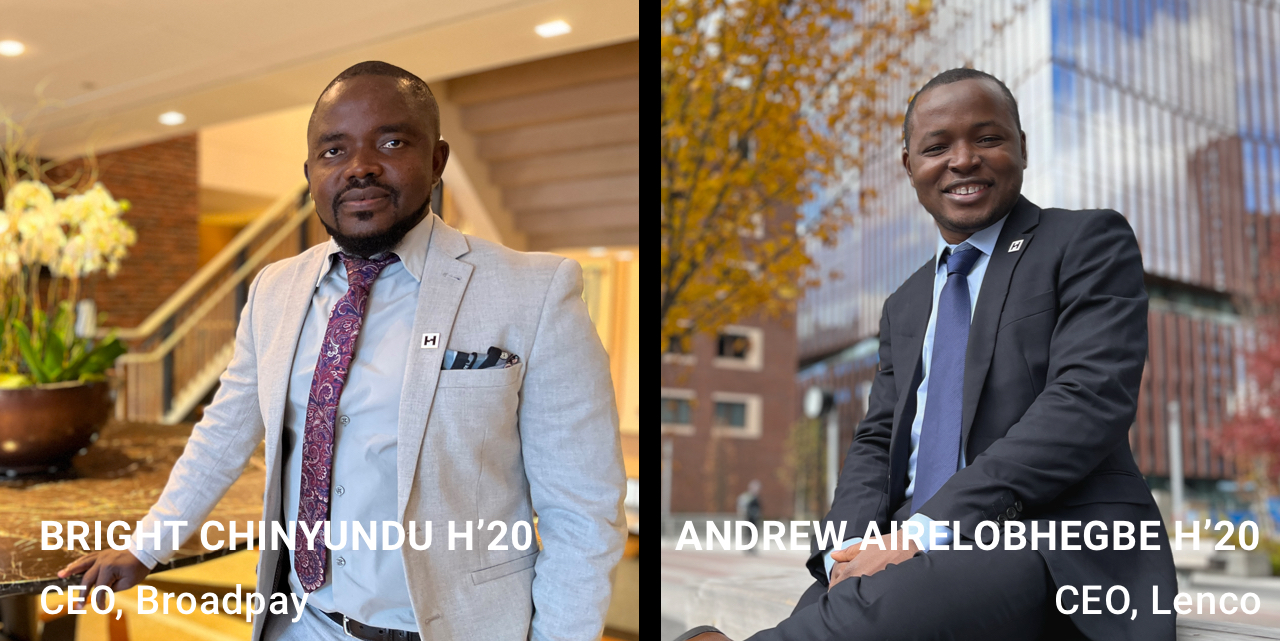When Bright Chinyundu H’20 and Andrew Airelobhegbe H’20 crossed paths as roommates at the Harambe Bretton Woods Symposium in 2021, neither anticipated the enduring friendship and transformative business partnership that would emerge from their chance meeting. Chinyundu, the CEO and founder of Zambia-based BroadPay, and Airelobhegbe, co-founder and CEO of Nigeria’s Lenco, have since leveraged their shared vision to forge a cross-border alliance that is reshaping fintech in Africa.
Navigating Early Challenges at BroadPay
Chinyundu launched BroadPay, a payments solution, in 2013 with ambitions to simplify financial transactions in Zambia. However, after raising seed capital, he found himself ceding control to a majority investor, a decision that left him with limited autonomy. “From the beginning, they were calling the shots,” Chinyundu recalled. Determined to reclaim control, he developed Sparkle, a separate product aimed at re-establishing his independence. Ultimately, he was able to buy out the early investor and integrate Sparkle into BroadPay’s operations, setting the stage for broader aspirations.
The Harambean Alliance: A Catalyst for Collaboration
The turning point in Chinyundu’s journey came through the Harambe Alliance, a network of African innovators and entrepreneurs. Seeking to expand beyond Zambia’s small market, Chinyundu began promoting his ideas within the Alliance, leading to a pivotal encounter with Airelobhegbe at the Bretton Woods retreat. Airelobhegbe’s Lenco was tackling similar challenges in Nigeria, and the two entrepreneurs saw an opportunity to collaborate. With Airelobhegbe’s support, Sparkle entered the Nigerian market under Lenco’s license, marking the start of a fruitful partnership.
The Alliance’s local events in Lagos proved instrumental. One such event reconnected Chinyundu with GB Agboola of Flutterwave, whom he had met during an Alibaba fellowship in China. The renewed connection led to Chinyundu establishing Sparkle’s office in the same building as Flutterwave’s headquarters, bolstering his confidence in navigating foreign markets. “You feel safe when you can go to a foreign country and call anyone,” Chinyundu said.
A Divide-and-Conquer Strategy for Regional Growth
As Sparkle gained traction, Chinyundu set his sights on South Africa, only to encounter regulatory hurdles. Recognizing the need for localized approaches, he and Airelobhegbe devised a “divide and conquer” strategy. Sparkle would focus on Southern Africa, appealing to the region’s cultural nuances, while Lenco would dominate the Nigerian market. “Local context matters,” Chinyundu explained. “While we can push the Sparkle brand in Southern Africa, Nigeria’s culture fits with the Lenco brand.” The partnership’s regional focus has positioned Chinyundu to explore further expansion into Malawi, Zimbabwe, Botswana, Mozambique, and Angola.
Building Networks for Success
Chinyundu credits the Harambean Alliance for his venture’s survival and growth. “Networks like the Harambean Alliance are the only reason why my venture is alive today,” he said. Okendo Lewis-Gayle, Chairman and Founder of Harambeans, highlighted the significance of the partnership: “This story exemplifies how Harambeans, united by shared values, build trust and leverage it to expand and collaborate. It showcases the strong, supportive coalitions within our network.”
Xeno: Another Harambean Success Story
Aeko Ongodia H’20, another Harambean, illustrates the Alliance’s transformative potential. Ongodia founded Xeno, a goal-based investment platform, in Uganda and has since expanded into Nigeria and Kenya. Membership in the Alliance, secured through a pitch competition at Wharton, provided Ongodia with invaluable connections to market players, consultants, and investors.
“The greatest value of the Alliance is the introductions,” Ongodia said. “It’s not just about audience access but about fostering relationships with entrepreneurs and investors across geographies.” These relationships paved the way for an acquisition in Nigeria that Xeno is set to finalize. Reflecting on the impact of the Harambean network, Ongodia remarked, “Everyone I needed to meet was there.”
A Blueprint for Pan-African Innovation
The stories of Chinyundu, Airelobhegbe, and Ongodia underscore the power of collaboration and shared values in driving innovation across Africa. Through the Harambean Alliance, these entrepreneurs have built bridges across borders, creating opportunities that might otherwise have been out of reach. As they continue to expand and innovate, their journeys offer a blueprint for leveraging the Harambean Alliance to overcome challenges and achieve success on a continental scale.
